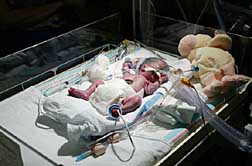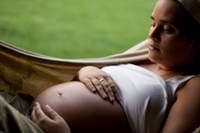LAWSUITS NEWS & LEGAL INFORMATION
Celexa Birth Defects
Recent studies have found that babies exposed to Celexa (Citalopram) during certain periods prior to birth run a risk of experiencing Celexa side effects. Those Celexa birth defects include a risk of persistent pulmonary hypertension of the newborn (PPHN), oral cleft, Hypoplastic Left Heart Syndrome and coarction of the aorta. A potential link between Celexa and birth defects has been reported in published studies including one published in the New England Journal of Medicine.
 Celexa, known generically as citalopram, is in a class of drugs known as Selective Serotonin Reuptake Inhibitors (SSRIs). SSRIs work by increasing or restoring serotonin levels in the patient's brain and relieving depression. Celexa is used to treat patients, including pregnant women, with major depressive disorder and obsessive-compulsive disorder.
Celexa, known generically as citalopram, is in a class of drugs known as Selective Serotonin Reuptake Inhibitors (SSRIs). SSRIs work by increasing or restoring serotonin levels in the patient's brain and relieving depression. Celexa is used to treat patients, including pregnant women, with major depressive disorder and obsessive-compulsive disorder.
Studies suggest that Celexa can increase the risk of birth defects when taken by pregnant women, although the doses used in these studies were higher than normal therapy doses. Celexa is excreted in breast milk, and it may cause excessive sleepiness and/or weight loss in a nursing infant so it is not recommended that women breastfeed while taking Celexa. The FDA classifies Celexa as Pregnancy Category C, meaning that studies in animals suggest the medication could be linked to an increased risk of birth defects; however, there are no well-controlled studies involving humans. As a result, the FDA recommends that Celexa only be used during pregnancy if the benefits outweigh the risks.
In August 2011, the US FDA announced that it was revising the labeling of Celexa to warn patients about risks associated with the medication. Specifically, the FDA warned that patients should not take more than 40 mg per day because of an increased risk of potentially fatal heart problems when Celexa is taken at a higher dose. The announcement was made following a study that revealed patients who took 60 mg of Celexa daily had a higher risk of heart problems related to the heart's electrical activity than patients who took a lower dose or took a placebo.
In March 2012, the FDA changed the warning label for Celexa, to alert patients that the drug is not recommended in patients with congenital long QT syndrome. Furthermore, the FDA recommended a maximum daily dosage of 20 mg for patients older than 60.
In February, 2006, the New England Journal of Medicine reported that babies exposed to antidepressants such as Celexa in the last trimester were six times more likely to be born with PPHN than babies who were not exposed.
According to the report, up to 12 newborns in 1,000 developed persistent pulmonary hypertension (PPH) after exposure to SSRIs during pregnancy, versus one to two newborns on average.
In December 2011, the FDA announced that there is no clear causal link between SSRI use while pregnant and the development of PPHN. Even though two studies suggested a link between the use of SSRIs while pregnant and the development of PPHN, three studies do not support such an association. The FDA advises women who are taking antidepressants while pregnant not to stop because of the risk to the fetus of having untreated depression.
Babies born with PPHN have abnormal blood flow through their heart and lungs, and their bodies are deprived of oxygen. This may cause organ failure in the brain and kidneys. About 20 percent of babies born with PPHN do not survive, and those that do may have long-term breathing problems.
A study published in the July 2011 issue of Obstetrics & Gynecology suggests a link between Celexa and neural tube defects. Researchers reportedly found that use of citalopram while pregnant—specifically during the first trimester of pregnancy—was associated with an increased risk of having a baby with a neural tube defect, including spina bifida.
A study published in the journal Archives of General Psychiatry suggests that women who take an SSRI antidepressant during the 12 months prior to delivery are at an increased risk of having a baby with autism spectrum disorder. According to researchers, women who took an SSRI during the before delivery had approximately twice the risk of having a baby born with autism. When women took an SSRI during the first trimester, the risk of a baby born with autism spectrum disorder jumped to approximately four times that over women who did not take an SSRI.
Celexa and Coarction of the aorta: Coarction of the aorta occurs when the infant's aorta is too narrow, which results in uneven blood flow throughout the infant's body. This may require medical intervention and/or surgery.
Celexa and Hypoplastic left heart syndrome: Hypoplastic left heart syndrome occurs when the left side of the infant's heart—including the mitral valve, left ventricle and aorta—does not develop fully, possibly resulting in sudden death. Patients may require a heart transplant to survive. Furthermore, patients who survive may have to undergo additional surgery as they age.
Celexa and Pulmonary Stenosis: Pulmonary stenosis is a narrowing of the pulmonary valve, resulting in decreased blood flow to the lungs.
Celexa and Septal Defect: A septal defect is a hole that develops in the wall of the infant's heart. This can cause improper blood circulation, which forces the heart to work harder than it should to pump blood. Patients may require open-heart surgery.
Celexa and Tetralogy of Fallot: Tetralogy of Fallot is a birth defect involving narrowing of the pulmonary valve, large ventricular septal defect, dilated aorta connected to both the left and right ventricles and thickening of the right ventricle. It can result in blood not obtaining enough oxygen from the lungs before moving throughout the patient's body.
Celexa and Transposition of the Great Arteries: Also known as transposition of the great vessels, this occurs when the aorta and the pulmonary artery, which carry blood away from the heart, are reversed. It can result in a lack of oxygen in the blood and often requires surgery to recover.
Celexa and Craniosynostosis: Craniosynostosis occurs when one or more of the sutures in an infant's skull harden prematurely, which can cause a misshapen skull, intracranial pressure, and a lack of growth in the child's head. A 2007 study, which was published in the New England Journal of Medicine (06/28/07), found a potential link between the use of SSRis during pregnancy and craniosynostosis.
Celexa and Cleft Palate: A cleft palate occurs when the separate parts of the skull that form the roof of the mouth do not join. A cleft palate can cause problems with feeding, speech and breathing and can also cause ear infections and hearing loss.
Celexa and Cleft Lip: A cleft lip is a facial defect affecting the infant's upper lip, which can cause delays in speech and language.
Celexa and Club Foot: Club foot occurs when the bones, joints, muscles and blood vessels in an infant's leg and foot develop abnormally. Club foot presents with the foot turned inward and downward, and can cause pain and problems with mobility.
Last updated on
En Español CELEXA HPPR DEFECTOS DE NACIMIENTO
FREE CELEXA LAWSUIT EVALUATION
Send your Celexa claim to a lawyer who will review your claim at NO COST or obligation.
GET LEGAL HELP NOW
GET LEGAL HELP NOW
Celexa (Citalopram)
 Celexa, known generically as citalopram, is in a class of drugs known as Selective Serotonin Reuptake Inhibitors (SSRIs). SSRIs work by increasing or restoring serotonin levels in the patient's brain and relieving depression. Celexa is used to treat patients, including pregnant women, with major depressive disorder and obsessive-compulsive disorder.
Celexa, known generically as citalopram, is in a class of drugs known as Selective Serotonin Reuptake Inhibitors (SSRIs). SSRIs work by increasing or restoring serotonin levels in the patient's brain and relieving depression. Celexa is used to treat patients, including pregnant women, with major depressive disorder and obsessive-compulsive disorder.
Studies suggest that Celexa can increase the risk of birth defects when taken by pregnant women, although the doses used in these studies were higher than normal therapy doses. Celexa is excreted in breast milk, and it may cause excessive sleepiness and/or weight loss in a nursing infant so it is not recommended that women breastfeed while taking Celexa. The FDA classifies Celexa as Pregnancy Category C, meaning that studies in animals suggest the medication could be linked to an increased risk of birth defects; however, there are no well-controlled studies involving humans. As a result, the FDA recommends that Celexa only be used during pregnancy if the benefits outweigh the risks.
In August 2011, the US FDA announced that it was revising the labeling of Celexa to warn patients about risks associated with the medication. Specifically, the FDA warned that patients should not take more than 40 mg per day because of an increased risk of potentially fatal heart problems when Celexa is taken at a higher dose. The announcement was made following a study that revealed patients who took 60 mg of Celexa daily had a higher risk of heart problems related to the heart's electrical activity than patients who took a lower dose or took a placebo.
In March 2012, the FDA changed the warning label for Celexa, to alert patients that the drug is not recommended in patients with congenital long QT syndrome. Furthermore, the FDA recommended a maximum daily dosage of 20 mg for patients older than 60.
Celexa Side Effects
According to the report, up to 12 newborns in 1,000 developed persistent pulmonary hypertension (PPH) after exposure to SSRIs during pregnancy, versus one to two newborns on average.
In December 2011, the FDA announced that there is no clear causal link between SSRI use while pregnant and the development of PPHN. Even though two studies suggested a link between the use of SSRIs while pregnant and the development of PPHN, three studies do not support such an association. The FDA advises women who are taking antidepressants while pregnant not to stop because of the risk to the fetus of having untreated depression.
Babies born with PPHN have abnormal blood flow through their heart and lungs, and their bodies are deprived of oxygen. This may cause organ failure in the brain and kidneys. About 20 percent of babies born with PPHN do not survive, and those that do may have long-term breathing problems.
Celexa and Neural Tube Defects
Celexa and Autism
Other Celexa Birth Defects
Celexa and Hypoplastic left heart syndrome: Hypoplastic left heart syndrome occurs when the left side of the infant's heart—including the mitral valve, left ventricle and aorta—does not develop fully, possibly resulting in sudden death. Patients may require a heart transplant to survive. Furthermore, patients who survive may have to undergo additional surgery as they age.
Celexa and Pulmonary Stenosis: Pulmonary stenosis is a narrowing of the pulmonary valve, resulting in decreased blood flow to the lungs.
Celexa and Septal Defect: A septal defect is a hole that develops in the wall of the infant's heart. This can cause improper blood circulation, which forces the heart to work harder than it should to pump blood. Patients may require open-heart surgery.
Celexa and Tetralogy of Fallot: Tetralogy of Fallot is a birth defect involving narrowing of the pulmonary valve, large ventricular septal defect, dilated aorta connected to both the left and right ventricles and thickening of the right ventricle. It can result in blood not obtaining enough oxygen from the lungs before moving throughout the patient's body.
Celexa and Transposition of the Great Arteries: Also known as transposition of the great vessels, this occurs when the aorta and the pulmonary artery, which carry blood away from the heart, are reversed. It can result in a lack of oxygen in the blood and often requires surgery to recover.
Celexa and Craniosynostosis: Craniosynostosis occurs when one or more of the sutures in an infant's skull harden prematurely, which can cause a misshapen skull, intracranial pressure, and a lack of growth in the child's head. A 2007 study, which was published in the New England Journal of Medicine (06/28/07), found a potential link between the use of SSRis during pregnancy and craniosynostosis.
Celexa and Cleft Palate: A cleft palate occurs when the separate parts of the skull that form the roof of the mouth do not join. A cleft palate can cause problems with feeding, speech and breathing and can also cause ear infections and hearing loss.
Celexa and Cleft Lip: A cleft lip is a facial defect affecting the infant's upper lip, which can cause delays in speech and language.
Celexa and Club Foot: Club foot occurs when the bones, joints, muscles and blood vessels in an infant's leg and foot develop abnormally. Club foot presents with the foot turned inward and downward, and can cause pain and problems with mobility.
Celexa Legal Help
If your child was born with a birth defect or suffered other side effects, and you took Celexa while pregnant, you may be eligible for compensation. Please click the link below to send your claim to a Celexa lawyer who will review your case at no cost to you.Last updated on
CELEXA LEGAL ARTICLES AND INTERVIEWS
Celexa Birth Defect Studies: Thorough, But Limited

Celexa Linked to Birth Defects in Studies

Celexa Lawsuit Results in Settlement with Idaho
.jpg)

November 20, 2012
In August, the online publication Slate (8/7/12), owned and controlled by the same organization that publishes The Washington Post, devoted some space to the ongoing debate over pregnancy and SSRI antidepressants, and the effect the latter could have on a fetus. Celexa, part of the Selective Serotonin Reuptake Inhibitor (SSRI) class, has been cited for rare Celexa birth defects. READ MORE
Celexa Linked to Birth Defects in Studies

September 14, 2012
Although one of the most reported and studied of the Celexa birth defects is likely persistent pulmonary hypertension of the newborn (PPHN), there are reportedly other Celexa side effects in infants that pregnant mothers could be rightly concerned about. In fact, studies suggest that Celexa is linked to birth defects other than PPHN. READ MORE
Celexa Lawsuit Results in Settlement with Idaho
.jpg)
August 26, 2012
The widely-held position by the US Food and Drug Administration (FDA) that drugs are considered acceptable for use if the benefits for the intended patient outweigh the risks, has never been debated more stringently than with SSRI antidepressants and their relationship to pregnant women. Specifically Celexa (Citalopram), and the potential for Celexa birth defects. READ MORE
READ MORE Drugs/Medical Settlements and Legal News

READER COMMENTS
Belinda
on
Charity
on
Kentucky
on
Mississippi
on
Colorado
on
British Columbia
on
Georgia
on
Kansas
on
Nebraska
on
Pennsylvania
on